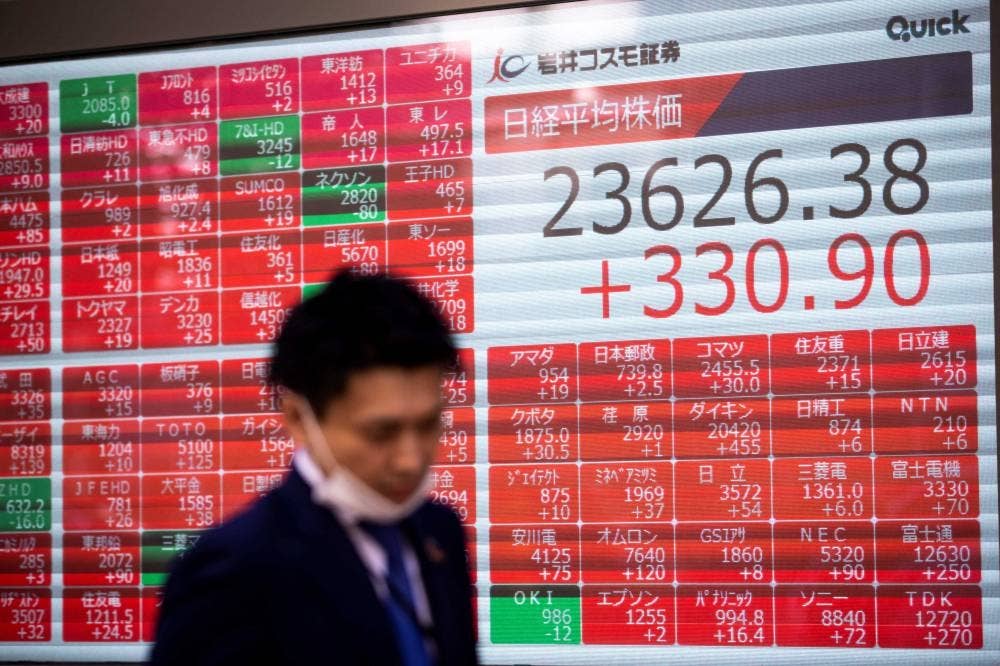Asian stocks up as recession fears ease, yen rises after Abe shooting

HONG KONG - Asian markets rose Friday on easing recession fears with optimism boosted by hopes that Joe Biden will remove some Trump-era tariffs from Chinese goods, while the euro extended losses and headed close to parity with the dollar.
The safe-haven yen also picked up following news of Japan's former prime minister Shinzo Abe being shot during a campaign rally. He is still fighting for his life. He later died at the hospital.
Equities were also boosted by reports that Beijing was considering a huge stimulus push to the struggling economy by allowing local governments to raise billions of dollars through bond issuance for infrastructure projects.
But surging inflation, rising interest rates and a fresh flare-up of Covid infections in Shanghai continued to keep investor sentiment grounded.
Traders were handed a strong lead from Wall Street, where all three main indexes climbed for a fourth straight day, helped by two top Federal Reserve officials who said the economy could withstand sharper rate hikes and maintain growth.
There has been growing talk that the fast pace of monetary tightening by the bank will tip the world's top economy into recession.
But Christopher Waller, a member of the board of governors, said worries were overblown and that a strong jobs market would provide a buffer, adding that rates needed to go up sharply and quickly. St Louis Fed president James Bullard also said there was "a good chance of a soft landing".
Asian equities advanced with Hong Kong, Shanghai, Sydney, Seoul, Singapore, Wellington, Mumbai, Taipei, Manila and Jakarta all in the green. Shanghai closed slightly down.
Tokyo's Nikkei 225 ended up but saw its early big gains wiped out after news filtered through of Abe's shooting.
Some observers said that because he still held sway over his ruling LDP party, it continued to stick with his ultra-loose monetary policy known as Abenomics.
The yen briefly strengthened to 135.34 per dollar, compared with 136.08 in the morning, as analysts speculated on how the possible loss of Abe's still-strong influence in Japan could see changes in policy.
Masahiro Yamaguchi, of SMBC Trust Bank, said: "It could be negative for markets if the government's policy, including its stance on monetary easing, is affected as it was evident that he was pulling the strings behind the scenes in many ways.
"If it becomes possible for (current Prime Minister Fumio) Kishida to carry out policies he wanted to, such as financial tax and regulations on share buy-back, that would be negative for markets."
- US jobs in focus -
The Fed's policy plans will be in focus later Friday when US employment data is released, with a strong reading providing the central bank with evidence to stick to its hawkish line.
But Matt Simpson at StoneX Financial said there were indications the jobs market could be showing signs of weakness.
The report "is unlikely to deter the Fed from a 75 basis points hike this month. But when the precious non-farm payroll numbers begin to crumble, so does the Fed's argument that the US economy is robust", he said.
"And we're seeing early signs of that across multiple employment metrics."
"When we do see unemployment begin to rise and headline employment growth lose momentum it will be hard for the Fed to ignore," he added.
Biden is also reported to be holding a meeting later Friday with top advisers to discuss whether or not to lift some of the Trump-era tariffs imposed on around $300 billion of Chinese imports.
While he is also said to be considering another probe into other facets of Beijing's trade policy, analysts said the removal of the levies could boost China's export growth to the United States by about 20 percent.
The move could also help ease upward pressure on US inflation, which is running at a four-decade high.
The euro extended its losing streak, falling to $1.0072 for the first time in 20 years, a day after minutes from the European Central Bank's most recent meeting indicated that, unlike the Fed, it was happy to hike rates at a slower pace despite surging inflation.
And sterling continued to rise after Boris Johnson resigned Thursday as leader of the ruling Conservatives, paving the way for a new prime minister and bringing an end to weeks of political uncertainty in the United Kingdom.
Stocks in London, Paris and Frankfurt were flat in the morning.
- Key figures at around 0810 GMT -
Tokyo - Nikkei 225: UP 0.1 percent at 26,517.19 (close) Hong Kong - Hang Seng Index: UP 0.4 percent at 21,725.78 (close) Shanghai - Composite: DOWN 0.4 percent at 3,356.08 (close) London - FTSE 100: FLAT at 7,191.92 Dollar/yen: DOWN at 135.80 yen from 136.01 yen Thursday Euro/dollar: DOWN at $1.0100 from $1.0162 Pound/dollar: DOWN at $1.1941 from $1.2024 Euro/pound: UP at 84.60 pence from 84.49 pence West Texas Intermediate: DOWN 0.7 at $101.99 per barrel Brent North Sea crude: DOWN 0.5 percent at $104.17 per barrel New York - Dow: UP 1.1 percent at 31,384.55 (close) - AFP










